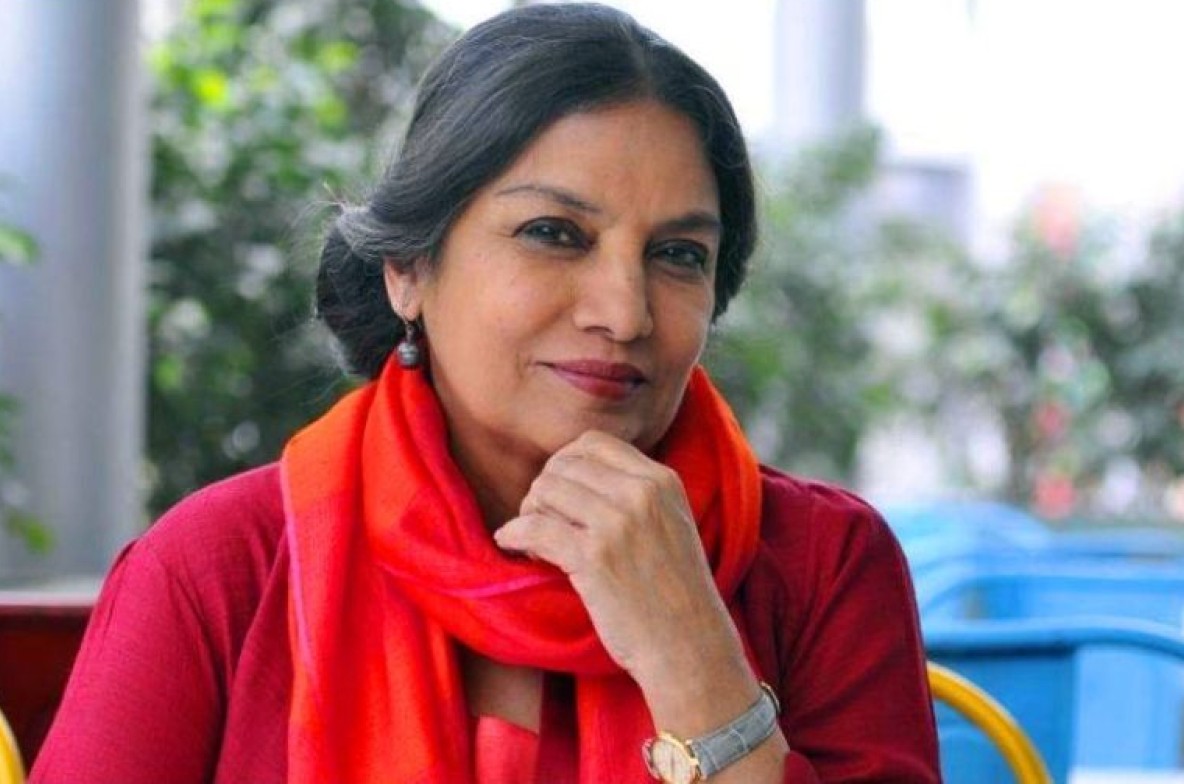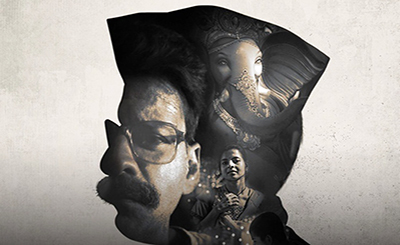
Shabana Azmi. Photo courtesy of Yellowstone Film Festival
Shabana Azmi receives lifetime Achievement Award from the Yellowstone Film Festival (YIFF) in New Delhi at the screening of Sheer Qorma. She talks about what it means to be one of the poster women of the LGBTQIA community.
One remembers joining the protests on the streets in Mumbai when the film Fire came under attack. The 1996 film by Deepa Mehta was one of the first to openly talk about same-sex attraction and love in India among bi-women. Starring Shabana Azmi and Nandita Das, it was a coming-out moment for many in the LGBTQIA (Lesbian, Gay, Bisexual, Trans, Intersex, Queer and Asexual) community despite the opposition from the right wing at the time. The film no doubt raised a few questions from the community itself, for instance: Did one woman turn to another only because she was rejected or misunderstood by her husband? At the time the joint statement issued by the cast and the director was that the film talked about choices. It nonetheless gave fodder to many debates, press and huge visibility to the Indian lesbian and bisexual community that had not received any ‘public’ attention until then.
Cut to Shabana Azmi receiving a lifetime Achievement Award for her film Sheer Qorma (2021) at the Yellowstone International Film Festival (YIFF) in New Delhi after the film was screened to a packed house, with people sitting on the steps of the auditorium that could easily seat 200 viewers. The elation in the auditorium was palpable and many eyes were wet with tears of joy, including those of director Faraz Arif Ansari, who shared that he had made the film for his mother. Divya Dutta, who plays a non-binary person, admitted to missing her co-star Swara Bhasker who could not make it to the awards and the screening. “It is an absolute pleasure that our film Sheer Qorma is being screened at YIFF and I am very grateful to the entire YIFF team for conferring me with the award,” said Dutta who received the Best Actress award. YIFF is curated by filmmaker Tushar Tyagi, whose short film, Saving Chintu, was shortlisted for the Oscars 2021.
(From left) Marijke Desouza,(producer, Sheer Qorma), Divya Dutta, Shabana Azmi and Faraz Arif Ansari (director of the film) at the Yellowstone International Film Festival (YIFF) in New Delhi.
Shabana Azmi expressed her pleasure receiving the Lifetime Achievement Award: “It has been a long and significant journey for the (LGBTQIA) community from the times of Fire to Sheer Qorma, and I feel extremely humbled and honoured to receive this award and so much love from the audience. Yellowstone International Film Festival is doing a great job to showcase independent cinema which creates a much-needed dialogue and a hope for change.”
Known for her roles in alternative cinema and the golden era of parallel cinema (1940s-1980s), the 69-year-old actor says she plays a mother who is trying to adjust to the revelation of her daughter’s sexuality; it represents many people who have difficulty ‘facing’ or dealing with the truth about their own children. “She’s a woman who doesn’t say, ‘this is just unbearable.’ She tries to cope with it, but feels really stretched. As long as her ‘daughter’ was abroad, the issue was not immediate, but once she arrived home, it became urgent. When she’s confronted by her (non-binary) daughter in India, it makes her realize that she is an important part of her life, too. So many people have had trouble accepting this of their children, but finally they come around because a mother’s love triumphs,” says Azmi. The sweet dish sheer qorma which Azmi makes for Dutta is symbolic of her moment of acceptance. The three women share and eat the qorma in a very moving sequence. Adding yet another layer to Dutta’s character, the non-binary daughter tells her mother (Azmi) that she is about to become a grandmother. It is reflective of many queer couples living abroad who have been able to marry and become parents through adoption or insemination.
Shabana Azmi and Divya Dutta at the YIFF in New Delhi.
Azmi agrees that this journey has milestones not just cinematically, but also on the ground, comprising years of struggle, protest and lobbying with socio-political and legal norm-makers by the (LGBTQIA) community. The big win was, of course, when the Indian Penal Code’s section 377, an old British law criminalizing homosexuality, was read down. Section 377 was used to intimidate, harass and even jail members of the community even though many did not even fully understand the legal ramifications of the law. When the law was overturned — the 150-year-old section was struck down in 2009 — ‘consensual homosexual activities’ between adults in India became legal.
It is important to understand that the minorities and the oppressed communities have to take dramatic steps for their identities to be seen and included, Azmi underlines. This is why, she says, she understands why people from the LGBTQIA community have developed their own fashion sense, art and culture. “When there’s this kind of social shift and change, you have to do something dramatic to capture people’s attention. So, the LGBTQ community dressing in a manner which brings visibility to them is their way of seeking comfort,” she asserts.
Dutta’s character wears a Nehru Jacket and formal men’s Kurta-Pajama at the table while eating a festive dinner prepared and served by her mother (Azmi) for her brother (Jitin Gulati), his wife (Priya Malik) and her partner (Swara Bhasker). Azmi’s character goes out of her way to serve and pamper the brother’s wife while virtually ignoring Dutta and her partner at the table. This leads to a big ‘kitchen confrontation’ where Dutta is made to feel unwelcome and thus leaves with Bhasker.
After much reflection, there is a heroic acceptance speech by her son, and a comment by her house help, who is like family. In a spiritual moment during azaan (call for prayer), the mother (Azmi), finally, accepts her non-binary daughter’s identity and that leads to a tearful yet joyous culmination of the film. “The mother represents the people who have trouble accepting their children as they are. My character comes with her own sets of conditioning and prejudices to finally realize that her acceptance is the only way forward, which I hope people do, too. After all love is not a sin,” concludes Azmi. We couldn’t agree more!
More from Culture
Comments
*Comments will be moderated











